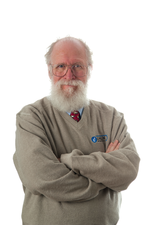Building on the efforts of yesterday's makers
Hard Work

"maddog" takes a quick look at some of the early pioneers of computing.
Recently, I spoke to a group of students at the University of São Paulo in Brazil. The occasion was the 40th anniversary of the university's offering a computer science degree, and my talk gave me a chance to reflect on computing history, how it came about, and how many people today have no idea of the work, effort, and plain brilliance of some of the early pioneers in computing.
It is easy to look back on the computing pioneers and say "Oh yes, of course" and to take their work and brilliance as natural fact, but when you put yourself in their place and try to imagine things that had never been done, it becomes a whole different story.
Many people have heard the story of Charles Babbage and how he tried to make a difference engine out of gears and cams back in the 19th century. A classic case of re-engineering, Babbage never completed any of his machines. But few people know that a couple of years later, a father and son team named Scheutz created a much simpler device of the same type and built two working machines. Soon after that, Martin Wiberg reworked the machine and build an even more successful difference engine.
[...]
Buy this article as PDF
(incl. VAT)
Buy Linux Magazine
Subscribe to our Linux Newsletters
Find Linux and Open Source Jobs
Subscribe to our ADMIN Newsletters
Support Our Work
Linux Magazine content is made possible with support from readers like you. Please consider contributing when you’ve found an article to be beneficial.

News
-
Fedora 43 Has Finally Landed
The Fedora Linux developers have announced their latest release, Fedora 43.
-
KDE Unleashes Plasma 6.5
The Plasma 6.5 desktop environment is now available with new features, improvements, and the usual bug fixes.
-
Xubuntu Site Possibly Hacked
It appears that the Xubuntu site was hacked and briefly served up a malicious ZIP file from its download page.
-
LMDE 7 Now Available
Linux Mint Debian Edition, version 7, has been officially released and is based on upstream Debian.
-
Linux Kernel 6.16 Reaches EOL
Linux kernel 6.16 has reached its end of life, which means you'll need to upgrade to the next stable release, Linux kernel 6.17.
-
Amazon Ditches Android for a Linux-Based OS
Amazon has migrated from Android to the Linux-based Vega OS for its Fire TV.
-
Cairo Dock 3.6 Now Available for More Compositors
If you're a fan of third-party desktop docks, then the latest release of Cairo Dock with Wayland support is for you.
-
System76 Unleashes Pop!_OS 24.04 Beta
System76's first beta of Pop!_OS 24.04 is an impressive feat.
-
Linux Kernel 6.17 is Available
Linus Torvalds has announced that the latest kernel has been released with plenty of core improvements and even more hardware support.
-
Kali Linux 2025.3 Released with New Hacking Tools
If you're a Kali Linux fan, you'll be glad to know that the third release of this famous pen-testing distribution is now available with updates for key components.

